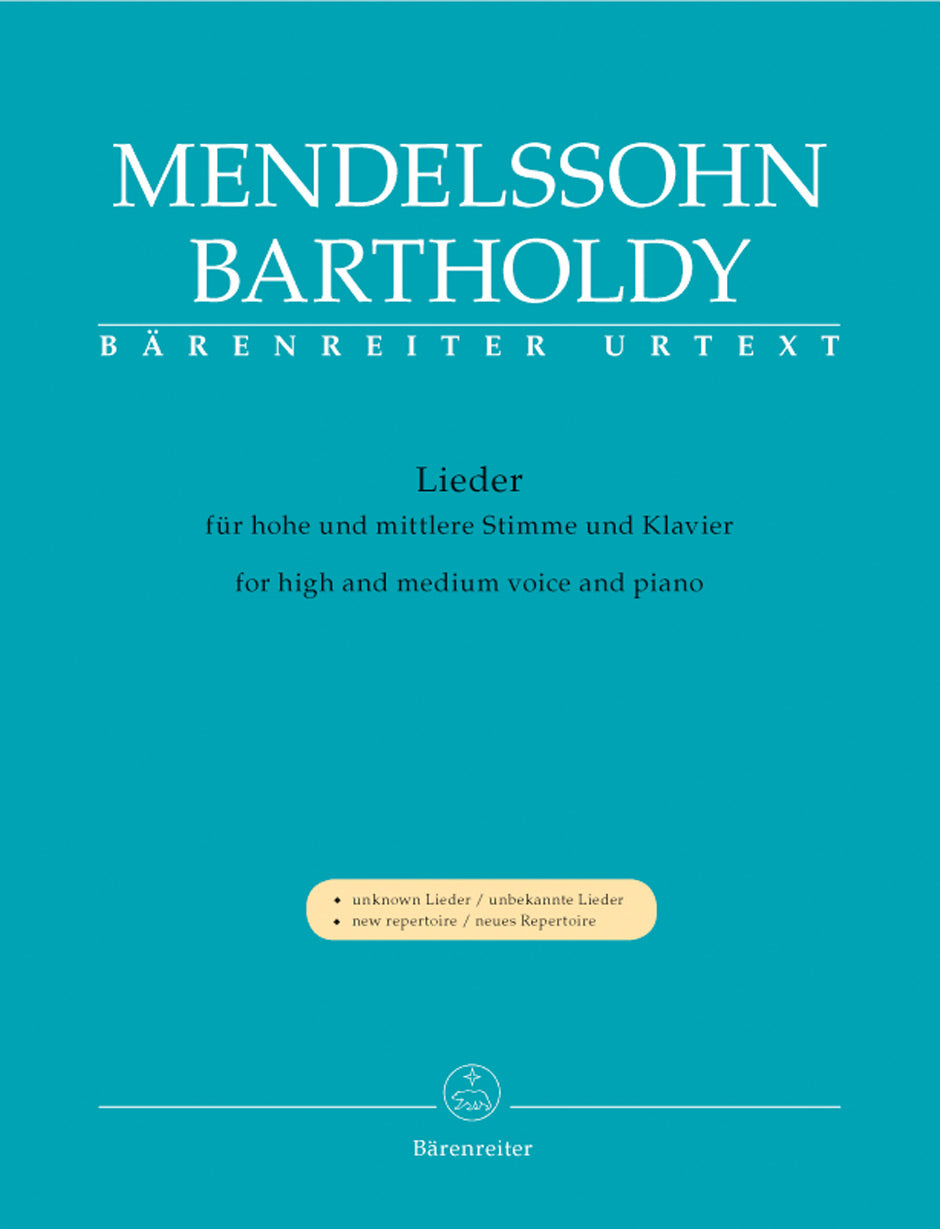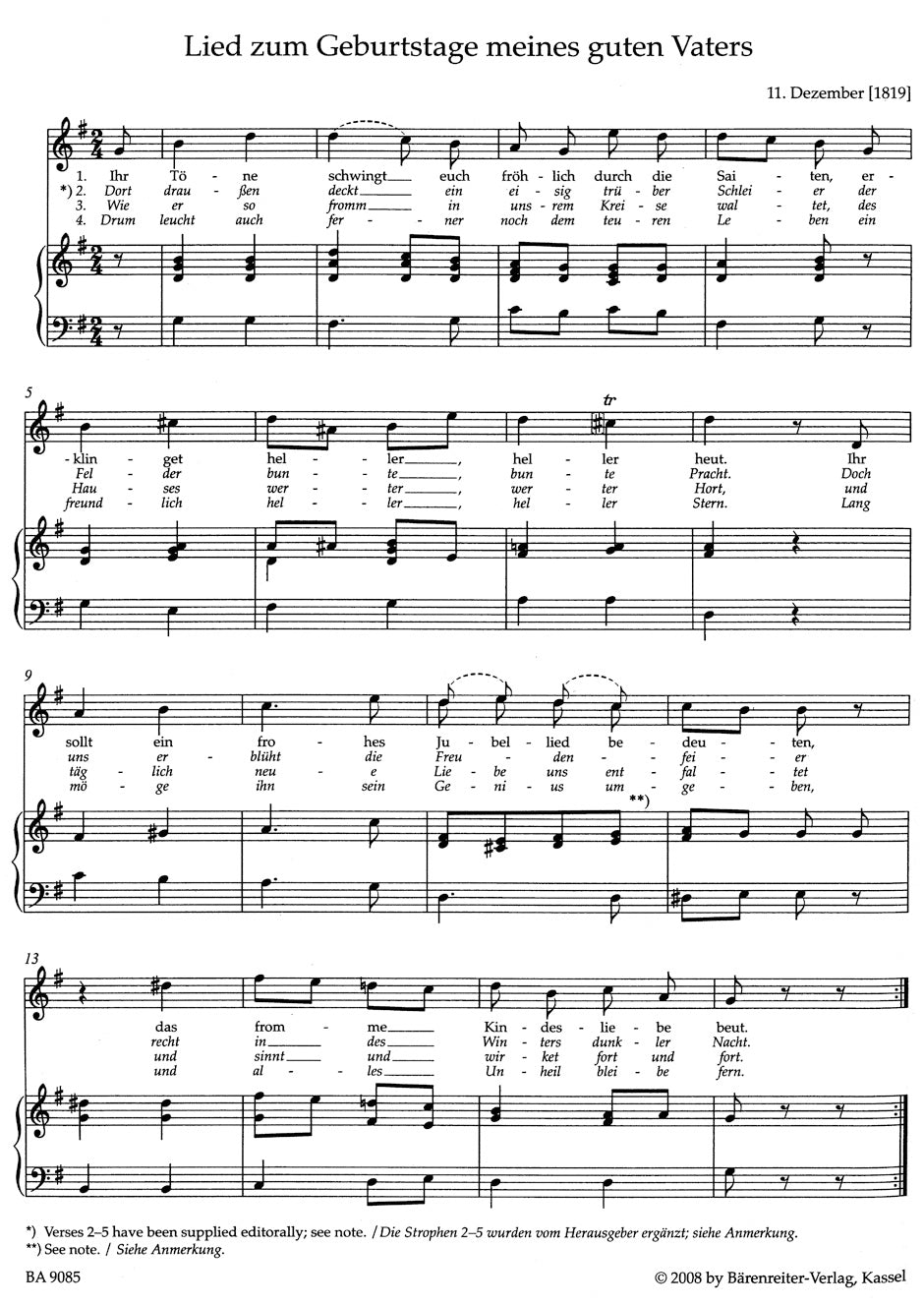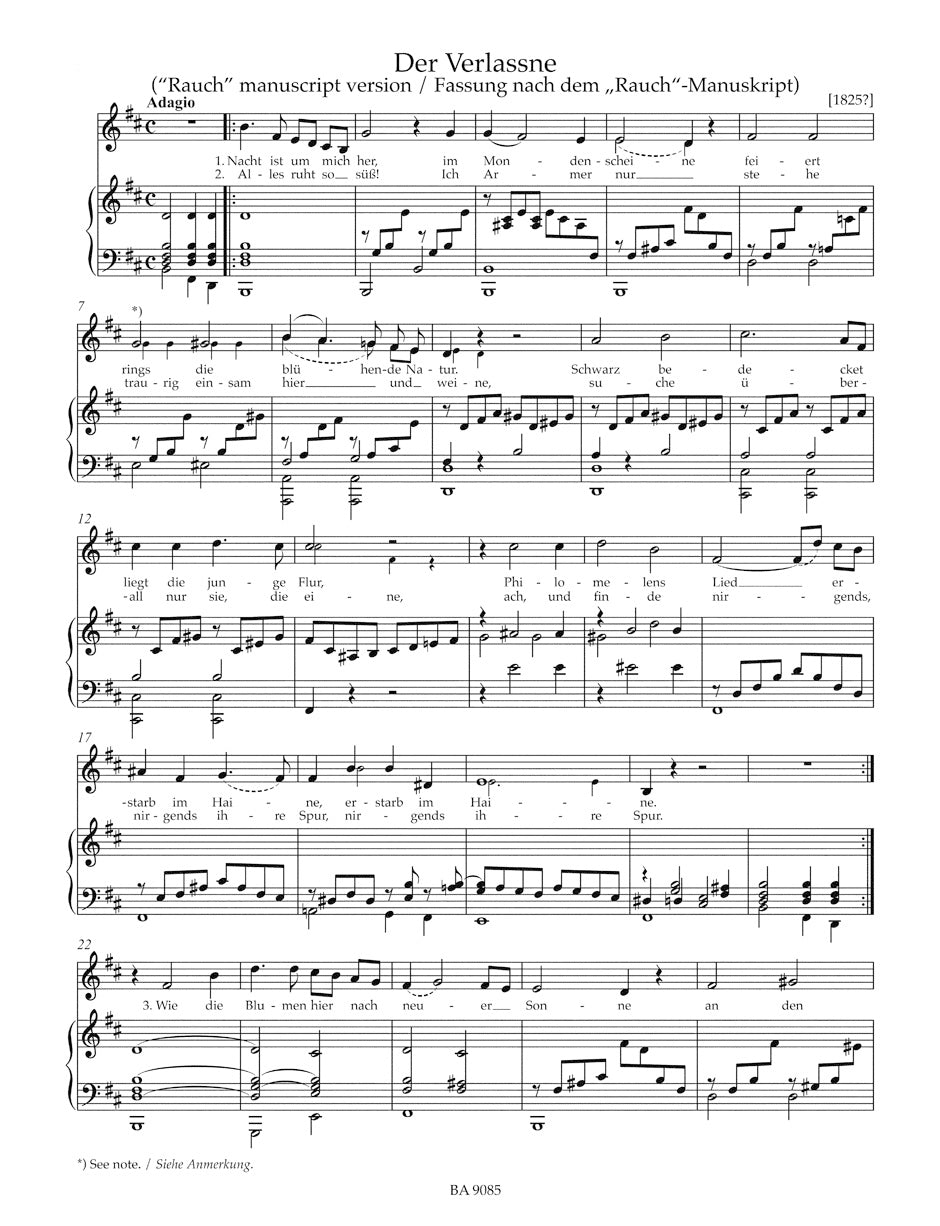Mendelssohn: Lieder
In stock and typically ships within 1 business day.
- Composer: Felix Mendelssohn (1809-1847)
- Format: High and Medium Voice
- Instrumentation: Piano, High Voice, Medium Voice
- Work Language: German
- ISMN:
- Size: 9.1 x 11.8 inches
- Pages: 154
- Urtext / Critical Edition
Description
The volume contains 46 previously unknown songs by Felix : settings of poems by Scott/ Storck, Matthisson, Hölty, Heine, Gellert and others are waiting to be discovered! From the "Lied zum Geburtstag meines guten Vaters", a joint composition with his sister Fanny and one of Mendelssohn's first surviving compositions, to works from his period of study with Carl Friedrich Zelter, the songs span his entire period of compositional activity.
Popular texts such as "Ich denke dein" by Friedrich von Matthisson (set by composers including Schubert, Beethoven, Weber and Wolf), "Erinnerung" by Heinrich Heine (set by Schumann, Cornelius, Franz and others) are now available in Mendelssohn‘s settings. Also included is his only song cycle " Vier Lieder" of 1830. These four songs are linked by motifs in a dramatic narrative structure.
- Lied zum Geburtstage meines guten Vaters
- "Ave Maria! Jungfrau mild" (Sir Walter Scott, German version by / Deutsch von D. Adam Storck)
- "Raste, Krieger! Krieg ist aus" (Sir Walter Scott, German version by / Deutsch von D. Adam Storck)
- "Pauvre Jeannette qui chantois si bien" (Jean-Pierre Claris de Florian)
- Die Nachtigall
- Der Verlassene (First version / Erste Fassung)
- Der Verlassne (Revised version / Revidierte Fassung)
- Der Verlassne ("Rauch" manuscript version / Fassung nach dem "Rauch"-Manuskript)
- "Von allen deinen zarten Gaben"
- Wiegenlied
- "Sanft weh'n im Hauch der Abendluft" (Friedrich von Matthisson)
- Faunenklage (Salomon Geßner)
- "Sicheln schallen, Ähren fallen" (Ludwig Christoph Heinrich Hölty)
- "Tanzt dem schönen Mai entgegen" (Ludwig Christoph Heinrich Hölty)
- "Am Seegestad, in lauen Vollmondsnächten" (Friedrich von Matthisson)
- "Durch Fichten am Hügel" (Friedrich von Matthisson)
- "Ich denke dein, wenn durch den Hain" (Friedrich von Matthisson)
- "Rausche leise, grünes Dach" (Albert Graf von Schlippenbach)
- "Seltsam, Mutter, geht es mir" (Johann Ludwig Casper)
- Der Wasserfall (Carl Klingemann)
- Glosse (Friederike Robert)
- "Weinend seh' ich in die Nacht"
- Charlotte to Werther (William Frederick Collard)
- "Weiter, rastlos, atemlos"
- [Vier Lieder (1839)]:
- [1.] Der Tag (Ludwig Ernst Friedrich Robert)
- [2.] Reiterlied
- [3.] Abschied
- [4.] Der Bettler
- Abschied
- Reiselied (Johann Ludwig Uhland)
- Weihnachtslied (Christian Fürchtegott Gellert)
- "Warum sind denn die Rosen so blass?" (Heinrich Heine)
- Andres Mailied, from / aus: "Des Knaben Wunderhorn" (First version / Erste Fassung)
- Hüt du dich, from / aus: "Des Knaben WUnderhorn" (Second version of / Zweite Fassung von Andres Mailied)
- Die Freundin (Marianne von Willemer), from / aus: Johann Wolfgang von Goethe, "Poetischer Nachlass" (First version, from the Honeymoon Diary / Erste Fassung aus dem Hochzeitstagebuch)
- Lied der Freundin (Marianne von Willemer) (Second version, for Marie Bernus / Zweite Fassung, for Marie Bernus)
- Mit getrockneten Blumen (Marianne von Willemer) (Third version of / Dritte Fassung von Die Freundin)
- Im Kahn (Heinrich Heine) (1837 version / Fassung von 1837)
- Im Kahn (Heinrich Heine) (1841 version / Fassung von 1841)
- Auf dem Wasser (Heinrich Heine) (1842 version / Fassung von 1842)
- Auf dem Wasser (Heinrich Heine) (1846 version / Fassung von 1846)
- "So schlaf iin Ruh!" (Hoffmann von Fallersleben)
- "O könnt' ich zu dir fliegen" (Maximilian von Schenkendorf) (First version / Erste Fassung)
- Gruß (Maximilian von Schenkendorf) (Second version / Zweite Fassung)
- Lieben and Schweigen (Konstantin von Tischendorf)
- Erinnerung (Heinrich Heine) (Second version / Zweite Fassung)
- "Und über dich wohl streut der Wind"
- Volkslied (Robert Burns), German version by / Deutsch von Ferdinand Freiligrath (Version from Cécile's 1845 Christmas Album / Fassung aus Céciles Weihnachtsalbum von 1845)
- "Es rauscht der Wald, es springt der Quell" (Johann Ludwig Tieck)
- Suleika (Marianne von Willemer)
- Erwartung
- "Vier trübe Monden sind entflohn" (Ludwig Christoph Heinrich Hölty)
Appendix I / Anhang I:
- "O könnt' ich zu dir fliegen" (Maximilian von Schenkendorf) (Frankfurt version / Fraknfurter Fassung)
- "Ch'io t'abbandono in periglio sì grande!" (Pietro Metastasio) (Aria from / aus: "Achille in Sciro")
- "In des Mondes feuchte Strahlen"
Appendix II / Anhang II (Eleven songs in alternative transpositions for high voice / Elf Lieder in alternativen Transponierungen for hohe Stimme):
- "Sicheln schallen, Ähren fallen!" (Ludwig Christoph Heinrich Hölty)
- "Tanzt dem schönen Mai entgegen" (Ludwig Christoph Heinrich Hölty)
- "Am Seegestad, in lauen Vollmondsnächten" (Friedrich von Matthisson)
- Glosse (Friederike Robert)
- Reiselied (Johann Ludwig Uhland)
- Die Freundin (Marianne von Willemer), from / aus: Johann Wolfgang von Goethe, "Poetischer Nachlass" (First version, from the Honeymoon Diary / Erste Fassung aus dem Hochzeitstagebuch)
- "So schlaf in Ruh!" (Hoffmann von Fallersleben)
- Erinnerung (Heinrich Heine) (First version / Erste Fassung)
- Volkslied (Robert Burns), German version by / Deutsch von Ferdinand Freiligrath (Version from Cécile's 1845 Christmas Album / Fassung aus Céciles Weihnachtsalbum von 1845)
Publishers use a lot of words to describe what they sell, and we know it can be confusing. We've tried to be as clear as possible to make sure you get exactly what you are looking for. Below are descriptions of the terms that we use to describe the various formats that music often comes in.
Choral Score
A score for vocalists that only contains the vocal lines. The instrumental parts are not there for reference. Generally, cheaper than a vocal score and requires multiple copies for purchase.
Facsimile
Reproductions of the original hand-written scores from the composer.
Full Score
For ensemble music, this indicates that the edition contains all parts on a single system (there are not separate parts for each player). In larger ensembles, this is for the conductor.
Hardcover
Hardbound. Generally either linen-covered or half-leather.
Orchestral Parts
Similar to a wind set, this is a collection of parts. In the case of strings, the numbers listed are the number of copies included, though generally these are available individually (often with minimum quantities required).
Paperback
When publishers offer multiple bindings (e.g. hardcover) or study scores, this is the "standard" version. If you're planning to play the music, this is probably what you want.
Performance / Playing Score
A score of the music containing all parts on one system, intended for players to share. There are not separate parts for each player.
Set of Parts
For ensemble music, this indicates that there are separate individual parts for each player.
Solo Part with Piano Reduction
For solo pieces with orchestra, this is a version that contains a piano reduction of the orchestra parts. For piano pieces, two copies are typically needed for performance.
Study Score
A small (think choral size) copy of the complete score meant for studying, and not playing. They make great add-ons when learning concertos and small chamber works.
Vocal Score
A score prepared for vocalists that includes the piano/organ part or a reduction of the instrumental parts.
Wind Set
For orchestral music, this is a collection of wind and percussion parts. The specific quantities of each instrument are notated.
With Audio
In addition to the printed music, the edition contains recordings of the pieces. This may be an included CD, or access to files on the internet.
With / Without Fingering (Markings)
Some publishers prepare two copies - a pure Urtext edition that includes no fingering (or bowing) suggestions and a lightly edited version that includes a minimal number of editorial markings.





